MTM chore suit from William Crabtree: Review
I know from experience that casual jackets often involve a compromise, for me.
Usually one size will be perfect on the neck, waist and sleeve, but another will be better on the shoulders, chest and body length. Basically, I’m a little taller and a little slimmer than the average, so neither standard size is quite right.
Of course, many people have bigger problems. Anyone that is shorter with a bigger chest, or taller with a smaller one, will know the frustrations of standard sizing.
But it is the something that has stopped me buying chore jackets in the past. Overshirts can be made bespoke, or adjusted easily. A chore in a heavier material is harder.
When I have bought them - such as this Bryceland’s one - it’s been when I feel the casual, almost sloppy nature of the style is more forgiving for the fit. I’ve sized up to get the right length, and accepted the larger body and neck.
There are brands that will make chores to measure. But none that also do garment washing - and this is key.
It’s the industrial washing of chore jackets that gives them a pleasing softness and fading. You get both a little with washing at home, but not for quite a long time and often not to the same degree.
Hence... my interest when James Priestley of William Crabtree & Sons said he had a factory that would make them for him, and garment wash each afterwards.
James’s background is as an agent in menswear, for William Lockie among others. He set up his own brand - William Crabtree - a few years ago, and last year opened a shop on New Quebec St, which is just to the west of Marylebone.
Initially James only offered made-to-measure tailoring, which wasn’t at the level we normally cover.
But he has since expanded, offering a lot of fairly traditional British menswear and a range of Lockie knitwear. There are quilted jackets, gilets, knitted ties and polka-dot handkerchiefs, alongside cashmere and cotton knits (not all shown online).
I particularly like the 1-ply sportshirts (actually the thickness of 2-ply, but we won’t get into that here) given I prefer my knitwear with a collar where possible. I have the charcoal and the navy (the images on the site aren’t great - the colours are actually standard greys and navy).
Last Autumn then, James and I began the process of making a chore ‘suit’. I’m not sure if that’s the right term - perhaps work suit is better - but essentially a chore jacket and trousers in the same material.
He has a good range of materials to pick from, although ideally I would have wanted a slightly tougher cotton (mine was 16oz, but doesn't feel it). And there are two basic styles of collar, one rounded (like mine) and one more pointed.
You can change a lot of other aspects of the design, including adding or removing pockets, and having pleats or flat fronts on the trousers. There wasn’t much I wanted to change to mine, given I wanted a very standard design.
The only things I did ask for were belt loops rather than side adjusters (as I felt a belt might be helpful breaking up the top and bottom) and tweaks on the sizing.
James has stock sizes in the shop, and we quickly established that my normal requirements were what we needed - that mix between two different sizes mentioned at the start. One on the neck/waist/sleeve, another on the shoulder/chest/length.
Plus I wanted a fuller leg and a slightly higher rise.
The jacket that came back was perfect - although, bear in mind that after years of not being able to find anything, any jacket that was long enough to cover my seat, and not massive in the body, would have made me happy.
We did have an issue with the trousers, which were a good inch or so too big in the waist. This could have been altered, but James was still at the point of trialling the process, and wanted the factory to redo them.
The second pair were much better. Initially a little tight, but the waist has actually softened and stretched a bit over time.
The material is, as I suspected, a touch light for what I wanted. Ideally it would be the more traditional weight of a French Vetra or Mont St-Michel. But it is very nice, soft and incredibly comfortable.
The question I’m sure some (more traditional) readers will be asking is, how the hell will I wear it?
The reason I liked the idea of the chore suit was that it could be a way to dress up what are, essentially, very casual clothes.
It will never be confused with a tailored suit. But with a shirt and loafers, it definitely has something in common with tailoring, while still being workwear.
It’s unusual - you rarely see anyone wearing one - and yet it doesn’t stand out much. It’s subtle, yet distinctive - which as regular readers will know, is always enough to get me interested.
The suit is also, as I said, very comfortable because there’s so little structure in it, and it’s a light, soft cotton.
That makes it nice in warmer weather too. Perhaps not the 30 degrees that we’ve enjoyed in London recently, but certainly into the low 20s.
Plus both the jacket and the trousers can be worn separately. I coined the phrase ‘three-way suit’ a few years ago to describe tailoring that could be worn like this - and it’s no coincidence that most of those suits were cotton too.
In fact, if James ever developed the pattern for it, I can see a very-unstructured-but-tailored blazer working as part of the set. Like a Boglioli, but made to to measure.
In terms of other styles, because the jacket has a nice collar I find it looks good with just a white T-shirt underneath, as shown above.
You can keep the same brown loafers on the feet, and it still looks fairly smart. Or you can go more contemporary and wear a deck shoe or similar, slim trainer. I’m wearing a white version of the 45R deck shoe below.
It’s a very casual look, but again, being a suit rather than simply a chore and chinos makes the whole dressier, as well as giving it more personality.
The T-shirt is a circular knit from The Flat Head, bought in Tokyo a few years ago.
An MTM chore suit from William Crabtree & Sons costs £650 in this cotton, but most woven materials are available. Corduroy is particularly popular. They take 4-6 weeks to make.
The regular, canvassed tailoring is made in a different factory and starts at £1150 for a made-to-measure suit.
The shop is at 15 New Quebec Street, London.
Clothes shown:
- Circular knit T-shirt from The Flat Head
- Linen deck shoes from 45R
- ‘Large working’ tote bag from Frank Clegg
- Button-down linen shirt from Luca Avitabile
- Brown loafers, LHS loafer from Alden, via Trunk
Photography: Jamie Ferguson @jkf_man
















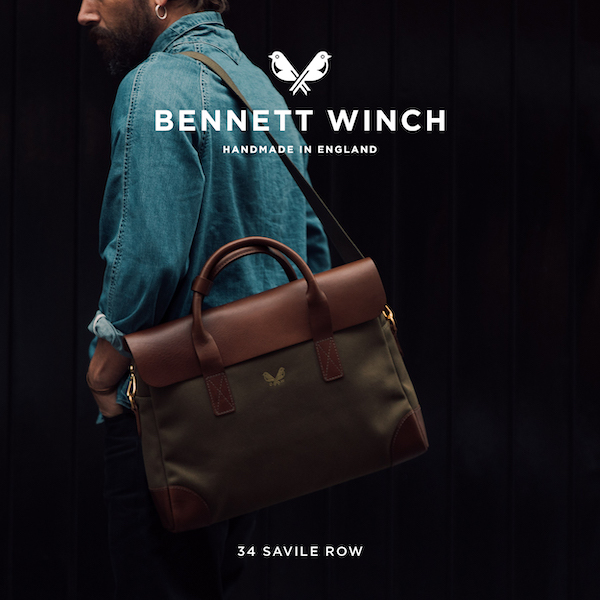







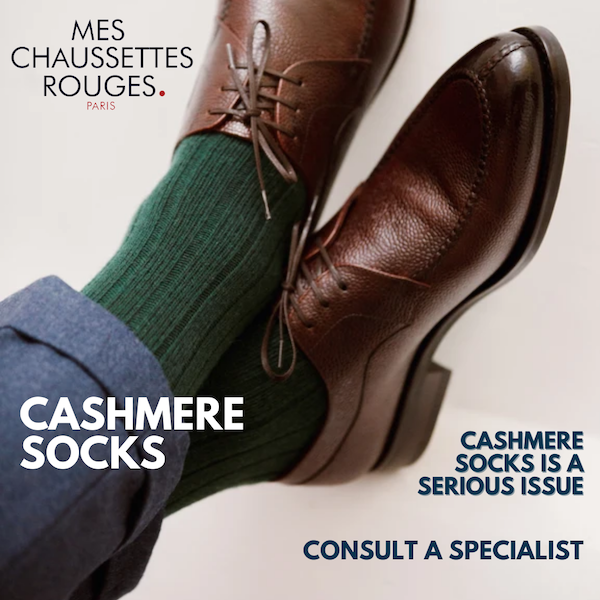










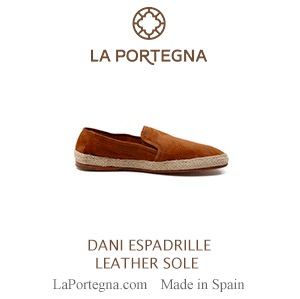




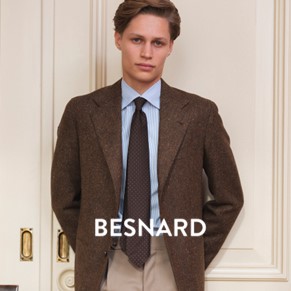
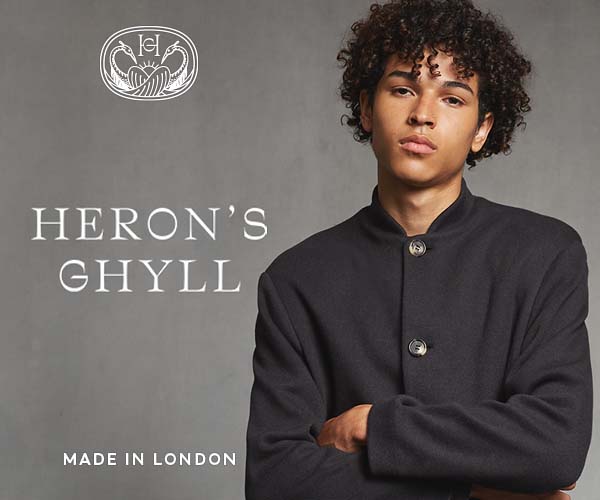

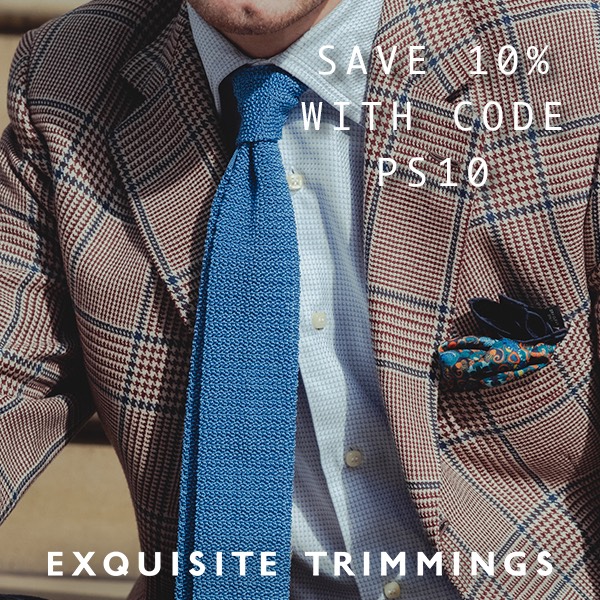
Hi Simon,
Enjoyable article as always. Can i ask what your intended use is for this? I must say i find the outfit overall rather unremarkable and not especially interesting. I can see that these garments may be useful for actual chores but i cant see why it would really warrant spending £650 for a workwear item that may actually not be very robust.
It’s certainly not for work, JJ, as I imagine is the case with the vast majority of high-end workwear. No one is gardening let alone hauling railway sleepers in any of this!
But a chore jacket is a great alternative for guys that don’t want to wear a tailored jacket – or ones that like a jacket but want a more casual alternative for the weekend. Chinos like this are of course very useful.
And if you can get both, giving you the option of wearing them separately or together as something more unusual, which looks slightly dressed up but is achingly comfortable, then that’s a real bonus.
Beautiful and interesting. But for most readers, how many suits and/or shackets/chore jackets should you own before its time for a bespoke chore suit? How often do you think you will use it?
If it could only be worn as a suit, Carl, I’d be with you.
But it’s a chore jacket, chinos, and a suit. So while it’s certainly not something worth getting if you already have several chore jackets/shackets, and navy chinos, it is a nice option otherwise, because you get both those and the more personal, perhaps even stylised, option of wearing both together.
Of course, the main point here is also that William Crabtree has these things made to measure. And you can just get a jacket, or just trousers, made to measure if you want to.
Hallo Simon,
that’s an interesting option. Does the process involve any fittings? And, as you also mentioned overshirts: Do you think a overshirt ‘suit’ would work as well?
Thanks
Manuel
No, it’s just the final suit that comes, but then adjustments can be made after that. Though as it’s garment dyed, a lot easier to take it than take out.
I’m not so sure about an overshirt suit, given the material would be lighter in weight. But it could work, I just think it would be more unusual Scott and Scott Fraser Collection was doing something along those lines this season, and in fact Anderson & Sheppard say some customers wear their linen pyjamas in that way on holiday!
The MTM offering does make sense from a value perspective – I recently purchased a Drakes chore jacket and have come to enjoy its slouchiness and versatility; the green goes with most jeans and chinos. The sizing isn’t perfect (in fact its fairly roomy), and factoring in its cost with a pair of decent-quality chinos on top I think William Crabtree is on to something here. Personally speaking I would probably just treat them as separates as you’ve suggested – thanks for bringing this to our attention, Simon.
Hi Simon,
Not entirely relevant perhaps but have you thought about releasing a PS linen shirt, similar to the white one from LA in the article? I think it would definitely fill a gap, having that flattering collar design and dimensions of the rest of the PS shirt range.
I myself would be very interested in white and light blue.
Hey Teo,
We probably won’t be, no, just because there are so many other linen shirts out there. Ours would be a little different of course, given the collar design, but we prefer to concentrate on things that are more different than that – usually when we’re using exclusive cloths that we feel offer something different again.
Thanks a lot for your reply Simon, this makes sense. Would you have any suggestions for good RTW linen shirt options?
Oh good.
My first port of call would be The Armoury, Anglo-Italian, Drake’s, Anderson & Sheppard.
Then at a step down, Berg & Berg, Cavour etc
Simon, how do Luca Faloni’s linen shirts (specifically the Portofino model) compare to the ones you’ve mentioned?
They’re nice, but really a different style. Not a dress shirt, not designed to be worn with a jacket and rarely designed to be tucked in.
I have a Mont St Michel work jacket, referred to above, and it is actually quite heavy and clearly a jacket.
Hi Patrick,
Yes, I was saying in my article I’d prefer these clothes to have been more in that kind of weight. Was that clear?
I really like this, the jacket has a fullness and drape which you don’t get with denim and it’s very practical-I could certainly see me wearing this to the park or zoo. I would definitely treat them as separates.
Corduroy trousers,in a deep brown, would be an solid choice to get me out of jeans or chinos.
Sorry Simon, in what way is this garment ‘bespoke’ it sounds much closer to made-to-measure? A shame to see that mis-use slip into the Permanent Style vocabulary.
Very good point Paul, and thanks for bringing it up. It’s not bespoke, but MTM. I guess more forgivable when we’re not talking about tailoring, but still, better to be consistent. I’ll change it
This is brilliant. As a tall person that needs MTM/bespoke in everything except underwear, I find the unavailability of MTM garment washed clothing very disappointing. At 650 GBP this seems very good value, and it fills this particular gap in the market, so I’m definitely putting it on the list of future purchases.
Thank you Robert
I’m very very tempted.
thanks for the write up!
Would William Crabtree also garment-wash a linen chore jacket (like Vetra does) or do they only do that with cotton?
Good question, I’m not sure. I think so, but I might ask them to confirm here on the range of materials available for garment wash/dye
Hello, yes, absolutely. Garment washed linen chore we can do. Many thanks, J
While I have your attention, James, may I ask which other materials you can garment-wash?
Sorry for the delayed reply. Most cloths, corduroy, linen and some denims.
Many thanks,
James
Thank you, James. I might pay William Crabtree a visit when next I’m in London.
That would be brilliant – thank you.
Interesting article! Does it mean William Crabtree & Sons can maked MTM garment washed chinos? I don’t see anything about their MTM service on their website. And if yes, would you consider ordering garment washed chinos in other colours from them as well?
Yes they can, and no the MTM isn’t on the website.
If I were just going for chinos, I’m not sure I would. I might want something a little heavier and sharper, like the Real McCoys or Rubato chinos we’ve covered recently. The Crabtree ones are nice, just a bit softer than I would personally go for.
Hello, yes, we can do garment washed mtm chinos. I am sorry the website does not make this clear. If you would like any further details do drop us a line. Sorry again, J
Thank you very much.
Simon, what are the differences between a chore jacket and an overshirt? They seem pretty small. Both are meant to be worn over a shirt or other clothing, both have pockets for easy access…
I know what you mean, but an overshirt is meant to look like a shirt. It’s a shirt that for whatever reason – material, fit – you wear over something else. And of course shirts have often had pockets.
A chore jacket is an outer layer, more comparable to a casual jacket.
Reminds me of my bid at sing sing, no thanks : )
Ahhh Simon. I am struggling to find my comment but about 8 months ago (often post anon) I asked what you though about the idea of a teba suit… and I dare say I noticed a bit of scoff in your reply to the negative. How times change.
Surely not!
Well here’s hoping I didn’t, but I wouldn’t be surprised if I did. It wouldn’t be the first time that’s happened.
The Teba style, that lapel and the straight cut, has never been quite me. But if it was the idea of a suit as a whole, I hold my hands up.
Interesting some comments here find this hard to imagine wearing – for me, someone who works in a creative industry where tailoring is reserved for awards ceremonies once a year at best, this would be the easiest thing in the world to wear. Flattering, comfortable, with the ability to wear with T-shirt’s, collared shirts, or in fact anything . I’ve loved drakes games suits for this very reason though their price point always seems ridiculous and the fit does not work on me. I think this is a great experiment Simon and the price feels accessible too.
One final point – I would dearly love a PS piece about how to size yourself when buying RTW and consider fit. Like many people here , I have made so many mistakes buying things that I realised later do not fit due to my irregular size, and have wasted a lot of money. It is fascinating hearing someone talk about how you may value the length of a piece over chest size . I realise it’s a big topic, but for many I imagine it would be invaluable.
Thanks Chris. That’s how I imagined someone wearing it, so nice to know that rings true.
Good point on fit. We cover that more with tailoring I guess – eg see video here on how a jacket should fit and another here on jacket length. And there was one here on a shirt fitting which covers aspects of fit.
Were there particular categories of clothing where you think this would be most useful?
Thankyou Simon.
I am very familiar with the tailored fit sections on PS; but when it comes to RTW – knowing and evaluating your shape and where to compromise on a perfect fit vs near enough vs style, is very, very tricky.
A good example i think was your tan RL blouson. I read that knowing i had made that mistake dozens of times – sizing for a close fit, only to later on realise more room would have been more flattering. Your take on that really resonated with me.
I think I, like many guys here, probably do not really know what a good fit even is, without a tailor there to guide. Experience tells me i often conclude myself wrong several months after the fact. The article in my mind that i’d most love to see, would not be broken down into clothing category necessarily as though useful, once you get into RTW, categories are far too numerous and varied – it would be more of a multi article guide (perhaps ‘translating lessons from tailoring to RTW’?), and probably instead need to be broken down instead into aspects of fit (length, shoulders, chest, neckline, waist etc) and each feature different pieces and what commonality they share, or diverge from in tailoring.
A vast undertaking i imagine, perhaps even impossible, but i’m sure you get where i’m going!
Thanks Chris. Yes I do, and clearly understood. I’ll have a think about how that might work
I’d like to second (third?) this. Size isn’t just about shoulders or waist. It’s about how it hangs and what it looks like. I’m a 36 chest, but short. I often find jackets too long in the arm, but the drape assumes I’m tubby. I’m not.
I just want to second what Chris said. This is really wearable. Not just that it is a suit, but also that it is made to fit better than a regular chore, which makes layering over a shirt look effortless and sharp at the same time. I would probably buy two colors of the chino so they could harmonize as separates, too.
If I wore this, no one would comment that I was overdressed, but someone (probably a woman) would comment that it is a nice looking jacket. Josh Peskowitz has been talking about the ”un-suit” for a while, and I think this is pretty much it .
Agreed. As someone who works for casual tech company, something like this would be quite wearable. It would stand out a bit for being a bit “style conscious”, but wouldn’t have the status presumption of wearing a suit.
All good points, and I personally relate to the last point. I too have bought many items in the past that seemed to fit at the time of purchase, yet overtime I realized do not.
Some of these misfitting items were clearly a misunderstanding of what is a proper fit (something that PS has helped explain). However, others are ones that I don’t understand what is flattering for my body type, how much movement I should maintain, what compromises I made by opting for a smaller or larger size, etc.
A great example for me is selvedge denim. I have been told/believed for a long time that I have “chicken legs”. I am 6’1” and only 185lbs with a slim frame. In the past, I have consistently bought skinny or slim fit because of that belief. I was left feeling trapped in a non-flexible, compression suit. I only recently bought a pair of E5 (relaxed tapered) from BHL and am blown away by how much more comfortable they are, despite not even being broke in yet.
The E5s have raised new questions, however. First, these are a “medium rise”, which I call a more proper rise compared to anything I had in the past (I have always had a low rise — thankfully I have learned how silly this is and don’t understand why so many chino/denim producers in the USA think that low rise is flattering/functional). Given my height and the previous low rise trousers, I have opted for a large (often a slim fit) to get the length right in most tops. I feel like the proper length is now a medium, but I have not tried new garments yet to confirm. Several of my shirts feel incredibly long now and I have noticed how they make my torso appear out of proportion. Second, I still lack great range of motion, although these are way better than my previous selvedge jeans. In college, I had a pair with stretch, which is undoubtedly a poor comparison, but I have noticed range of motion being a problem with other articles of clothing too.
On a different note, I too am marveled by someone who can probably evaluate compromises with different sizes, as well as know whether they have a tall neck, an elongated face shape, or small wrists. I think I am getting better, but only slightly. I am not sure if this skill comes more from experience or is more of a perception thing. So many people claim to have small wrists when in fact they are average.
Thank you Joel, really interesting. There’s clearly something here around how clothes should fit, the things that are universal and those that are personal, the ones that remain true over time and those that vary more with fashions.
Interesting idea for a suit Simon.I tried on a navy shirt jacket today with a pair of my indigo selvedge jeans.Looked fine.I’ll try it against some navy chinos sometime.The navy combo doesn’t look too affected.
On the issue of casual clothing, Simon, am trying to find what works when l take my daughters out on our dates. Smart blazers are a no to them, am also not a big fan of jeans. Please advise on what to wear out for an evening casual outing, in summer. I always want a jacket on, and not too fond of sweatshirts.
So it sounds like you want a casual jacket, or smart knitwear.
A more casual jacket than your smart blazer could be a cotton, linen or some kind of mix (eg wool/silk/linen) that was quite lightly made and even unstructured. You could even go for an overshirt or chore jacket, if that wasn’t too casual for you.
You could also look well dressed without a jacket, if that would work well for your daughters, by wearing really nice tailored trousers, good shoes, and then a lightweight summer knit, perhaps in cotton. Or a knitted polo shirt, long or short sleeved.
I hope that helps.
Do you know the house style of the MTM tailoring and where is it made? Would you be able to say the quality of make compares closer to an Anglo-Italian or say an entry level Gieves?
PS. I would still describe describe New Quebec Street as being firmly in Marylebone, although perhaps conceding it is to the West of Marylebone Village.
I can’t really comment on the tailoring, no. I wouldn’t compare it to Anglo-Italian, but I don’t what else it’s on a par with
Hopefully I can shed some light on this although it sounds like Simon may follow up on the MTM tailoring at Wm Crabtree in more detail at some point. I am a long time bespoke customer of Thom Sweeney, and also occasionally MTM and off the peg jackets and trousers from them along with lots of Drake’s ready to wear tailoring over the years and have for the past couple of years been having jackets, trousers and lately even shorts made MTM by Wm Crabtree so I feel like I’m in a good position to comment.
Obviously its MTM not bespoke so there isn’t much value in comparing it to Ethan or Thom’s cutting at Thom Sweeney bespoke but its every bit as good and I’d say virtually indistinguishable from other top end MTM. The key difference I see from one MTM like Sweeney or Drakes to another like Wm Crabtree isn’t really in the make or the fabric which they all largely share – I get offered the same bunches everywhere and I can source my own dead stock if I really want or buy direct from the mill as I sometimes do with Fox Brothers for example.
The main difference, I think, and I buy a lot of tailoring, is obviously the house style but crucially the expertise, experience and taste of the person helping you take that style and adapting it to your own. The guy holding the tape measure is key. This is where I think James at Wm Crabtree’s experience over the years and his taste add huge value. I visit Atlanta regularly and I feel the same way about Sid Mashburn. Both are personally stylish and very experienced guys but the quality at Crabtree is a step up.
It’s not easy buying tailoring at first and we all make mistakes in the early days of building a wardrobe but I think with someone like James guiding you, you’ll make many fewer! I know quite a few very stylish men who have ended up with Wm Crabtree for MTM recently and I think they’d all agree it’s right up there. Slightly wider lapel, great shape and nice finish. I still get some stuff made bespoke elsewhere but the majority of my gear now comes from Wm Crabtree. Really great MTM trousers too. Perfect cut, good drape, and clever little, old school touches like grip tape inside the waistband for your shirts.
Thank you for this. I have been thinking of getting something like this made as a daily uniform after wearing overshirt, white shirt and jeans for the past two years. Practical and understated. While probably not for most of your readers it is right up my street. Will visit when next in London.
It makes one look like a Plumber. Let me add I have the utmost respect for Plumbers and other tradies
An interesting experiment on how to upgrade workwear or downgrade tailoring – depending on how you look at it.
In my opinion the trousers and the jacket could have been interesting within the context of another outfit. As a suit they just look too utilitarian and virtually give the impression of a set of overalls.
Wether the ‘suit’ could be more wearable with some colour injected – a multicoloured neck square for example – is a question. Personally I’m doubtful.
Happily the trousers and jacket can have a life of their own.
I was going to say this seems like a caprice of someone that is so used to have bespoke everything rather than a real need, but on second thought, if you indeed consider them as separates that can then *also* be combined every now and then for a unique look, given the accessible price (for PS standards ofc, not me) which isn’t too far off from premium R2W, then it might actually make sense if the quality is comparable and you actually need/want those pieces (chino, chore).
On the same note as your comment on the available weight, I had decided to only have MTM shirts in the future given that good quality R2W costs as much (often more) than locally made M2M. But after doing just a few I realized the strength of R2W is not really pricing as I originally thought, but actually access to much more varied fabrics and patterns that many tailors do not have, particularly for casual shirting (I don’t really have any reason to have more than 1 formal white shirt). I suppose that’s why you often source your own cloth?
May I ask how much of a premium that generally turns out to be compared to having your tailor use their stock, since you can’t buy in bulk?
Nice points Andrea.
Yes, lack of range is certainly an issue with MTM shirts sometimes, also because suppliers of cut lengths for shirtmakers are used to dealing with a business customer mostly, where a lot of variation isn’t needed.
I only source my own cloth really when it’s cloth I’ve developed for PS. And the reason there is because those cloths don’t exist, usually bespoke or RTW.
It doesn’t end up being much more expensive as we can buy in decent bulk now. But if the tailor is used to making profit on the cloth, they may not take off the whole price of the cloth from what they then charge
I don’t really understand why they do that though, want to profit from the cloth.
Is it a way to try to make you think they’re charging you less for their work (as the rest is just unescapable material cost), and thus offer more value than they actually do?
Is it just a way to get more out of wealthier customers that can afford more premium fabrics over their basic ones? Particularly since prices often start low but rise quickly for any non-super-basic cloth. But on the other hand, maybe they just buy those in bigger bulks due to volume of sales.
No, it’s none of that. It’s just just a question of whether they see cloth as something they’re selling as part of the service. They put a margin on top of everything else they’re selling – their time etc – like every business does. That’s their profit. So it depends whether they see cloth as part of that.
I really like this, but then again I’m a massive fan of chore jackets and cry internally when I see hipsters bob past with their rolled up chinos and ridiculous trainers. They are a wonderful, and adaptable, wardrobe staple. The only challenge I found buying one is that I’m small and slim, and found it hard to get one that was boxy enough to be a proper chore jacket, but not so much so that it swamped me.
Personally, being fairly slim, I like casual outerwears that have a drawstring (or possibly belt, though that’s a bit more of a statement). It’s usually safari or field jackets rather than chores though. But then again I like those better anyway.
I like it, although personally I don’t feel I need a full suit like this. I do see how this dresses up the look, but it somehow feels a touch contrived to my eye (the kind of thing only a clothing geek would wear, if I can get away with saying that on here!). The jacket as a separate, however, works for me and I would imagine many others too.
I seem to recall Aleks Cvetkovic (of Handcut Radio fame) wrote an good article on the chore suit a while ago and I thought at the time that it sounded like an interesting option for less formal work places, but one that wouldn’t work personally unless I could find MTM (at 192cm but only 80kg, jackets with long enough arms and bodies generally fit like tents) .
A brief google suggests the article was titled “Why the chore jacket is the new business suit” but as it was published by the now defunct Jackal I’m not sure if, or how, it could be accessed? Doesn’t appear to have been archived by the wayback machine either sadly.
As usual Simon, thanks for highlighting something interesting!
Attica, attica… : )
The corduroy version seems a bit more interesting but then again there is a strong wes anderson association with that as well ?!?
I think you’d get that more with a normal corduroy suit, but even then it’s not something I find gets the association much.
Eg cord suit here – no comments about looking like Fantastic Mr Fox…
Probably your most proletarian outfit yet.
Simon, the idea of a chore suit is interesting in the abstract but in practice, wearing the two items together as an item is too much of a look; too contrived, as another reader commented. I also disagree with your comment that this is subtle, distinctive, and not stand out too much. People are bound to notice that the jacket and the trousers are made of identical material (as a suit would be), and when they see that the top doesn’t have a lapel, they’re bound to think it looks a bit weird, or at the least, question why.
This effect is especially pronounced if you pair with white sneakers; it just screams fashion item. (As you mention in your post on “flash vs. fuddy,” if you’re going to go bold on one item, it’s best to keep it low key on everything else.)
This look taps into the current trend toward workwear but it’s overly trendy and I don’t see it standing the test of time. That said, I suppose that there’s no huge penalty for taking a risk and experimenting, since you can always choose to wear each piece separately.
True.
I think you’d be surprised if you saw it in person though. It stands out less than you’d think, particularly I think if it were worn into a more casual office etc as others have mentioned.
I certainly agree on the trainers, they make it more of a look. Loafers are easier.
I disagree with the critique that you don’t need to have something like this bespoke. I see no reason to privilege the formal over the casual when it comes to getting a good fit. The same justifications apply to both. And there’s no doubt this one fits better than your Bryceland’s one.
I would have further extended the trousers and suppressed the waist though. Chore coats are associated with the slouchy silhouette that’s become popular, but I think one of their greater benefits is that the square cut makes the wearer look bulkier. I’d like to see something that takes advantage of this but in a more traditionally masculine silhouette.
Nice points Ben, thank you. I think there’s a risk with the jacket that if you suppress the waist, it starts to look like something else – given a chore is cut so straight. But you can do a bit more by just having a slimmer body in general, and perhaps tapering very slightly towards the hem I think.
Ben,
If I fasten one or two buttons of a Mont St Michel chore coat near my navel, I find that that it creates the appearance of waist suppression even though the body of the jacket is cut straight from the armhole to the hem. I suspect it has something to do with the rigidity of the moleskin fabric. Your mileage may, of course, vary.
Hi Simon; any insights on popping the collar up in most of the images? Besides it’s nice to do a kind of high low mix not by mixing up some actual pieces but by mixing ones principles (in this case formal wear, matching upper & bottom) into the other ones styles.
Hey Jochen,
I hadn’t thought about that actually. I think I usually wear the collar up on chore coats like this because of the way the front is made – without a larger lapel like you’d have on a tailored jacket. If you folded the collar down it would be a little small and skimpy perhaps.
On mixing principles, I think I get what you mean – but are you saying the way the collar is worn is an example of that?
Sorry if I’m being dumb
Ah, thanks; I follow the reasoning.
No, sorry, my thought has no relation to the collar comment. Should have put it on another line. Perhaps also should have used the word ‘pieces’ instead of ‘styles’ at the end.
Aha, that makes perfect sense then. Yes, mixing high/low with principles like that is effective – a chore coat as a navy suit, a tailored jacket made as soft as a cardigan and so on. Thanks for the point
Hi Simon – I’ve been thinking where to ask this, and it seems like this post would be a good place. Do you know anywhere that can garment dye an existing cotton unlined/unstructured suit/ chinos? Where they started navy but have faded? Thank you.
No I don’t, sorry Simon.
The problem you’ll have is that the process is normally at volume in a factory, so it’s very hard for an end consumer to find anywhere that will do just one piece
Thanks Simon – someone suggested a DIY job in the washing machine at home – but feeling nervous about doing so!
Yes, that’s always risky unless someone knows how that material will react…
Thanks for sharing Simon. I think it’s a great casual look. I have a couple of questions:
1 No it isn’t
2 I don’t think so, no, but I probably wouldn’t anyway given it’s not the point of the style
3 You can change most things you can in regular made to measure, including sleeve width. The limitation comes when you try to redesign it, or get bespoke levels of fit
Do you ever wear this with the collar not ‘popped’?
See comment above Daniel.
Hi Simon, do you plan to try William Crabtree’s MTM offering for tailoring too? I’d be interested to know how it compares to the other MTM jackets you have covered. I am curious about this one as there are fewer tailors in London offering a softer silhouette. I was tempted by Anglo Italian, but their low buttoning point upsets the proportions of the jacket, in my opinion.
Well-timed comment John. I am trying it at the moment, yes, and should have an article within a month or so
Ah, great! Looking forward to it.
Hi Simon, just wondering when you think this review might be ready? I’m trying to decide whether to go with them or not. Many thanks.
It should be soon, about two weeks
What’s the trouser fly opening like? They look a tad too high to open comfortably?
The trousers are fairly high rise, so the fly is high too, but no it’s not uncomfortable
Simon, I was wondering if you had tried on or seen William Crabtree’s lowgill jacket? It strikes me as the kind of unstructured blazer that could work as part of the set?
I haven’t Zy, but Manish covered it in this article